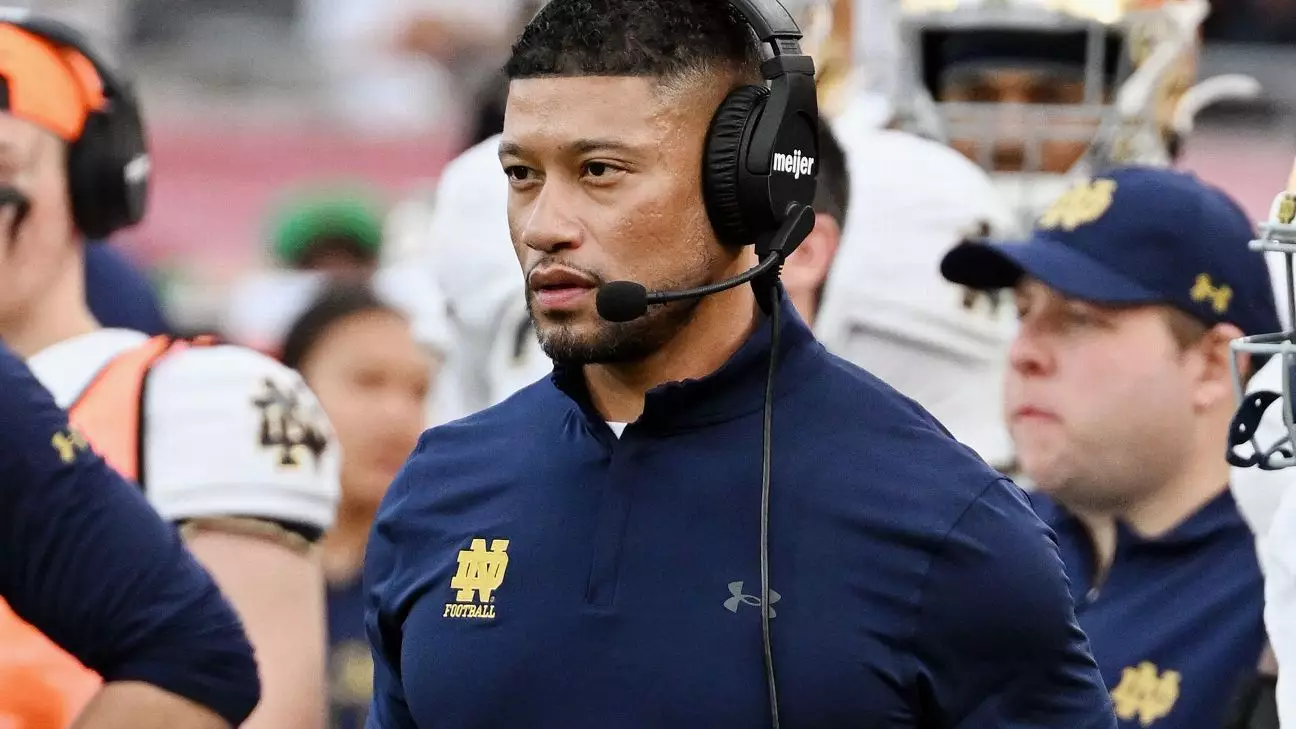As the excitement builds for the College Football Playoff Semifinal at the Capital One Orange Bowl, the matchup between Notre Dame’s head coach Marcus Freeman and Penn State’s James Franklin transcends the realm of ordinary competition. This game embodies a crucial moment in college football history; it presents the potential for the first Black head coach to lead a team to the national championship game. As scrutiny falls on this momentous occasion, both coaches reflect on the historical significance of their roles and the messages they aim to convey to future generations of coaches.
James Franklin vividly recalls the 2007 Super Bowl XLI, which made headlines for featuring two Black head coaches, Tony Dungy and Lovie Smith. Franklin, who was part of the coaching staff at Kansas State during that pivotal moment, emphasizes the inspiration that event provided for young and aspiring coaches, particularly within minority communities. His reflections on the current landscape reveal a contextual understanding of progress in football coaching— from a mere six Black head coaches at the time of the Super Bowl to now 16 out of 134 FBS programs. He recognizes the slow, yet tangible, movement towards inclusivity and the opportunities that lie ahead, emphasizing that every small increase is a step forward in the right direction.
However, Franklin’s optimism regarding a gradual increase must also contend with the reality that such changes are often slow-moving. The persistence of biases and traditional hiring practices means that the journey towards equality within coaching ranks is still fraught with challenges. He expresses hope that these historical moments—such as the Orange Bowl—will ignite further change and create more opportunities for future coaching aspirants of diverse backgrounds.
When Marcus Freeman steps into the arena, he carries not just the weight of his responsibilities as head coach but also the acknowledgment of his heritage. Freeman, who has Korean roots in addition to his African American identity, understands his pivotal role as a representative for underrepresented communities. He sees this moment not as a personal achievement but as an opportunity to elevate those who come after him. His desire to work tirelessly resonates through his acknowledgment that he must strive to be the best version of himself, serving as an inspiration to others in similar positions.
Freeman’s perspective emphasizes a collective aspiration, insisting that while individual representation matters, the broader goal is team success. His commitment to team glory indicates a profound sense of unity, revealing a mentality that prioritizes shared accomplishments over personal accolades. It underscores the essence of college sports—not just the celebration of individual triumphs, but the importance of fostering an environment conducive to collective growth.
Mentorship and the Path Forward
Both coaches illuminate the significance of mentorship in this defining moment in their careers. Freeman speaks passionately about his intention to inspire younger coaches, asserting that genuine impact goes beyond mere representation; it involves intentional actions that can lead to meaningful change. He hints at future initiatives that he hopes to launch, aimed at uplifting aspiring coaches, demonstrating a commitment to service that mirrors his ambitions on the field.
Franklin reinforces this notion of mentorship and responsibility as he prepares to face Freeman. He expresses gratitude for the opportunity to compete against a fellow coach who similarly values the progression of their profession. Both coaches understand that the visibility of their matchup will ripple beyond the stadium; it becomes a symbolic fight for greater representation in coaching roles across all sports, inspiring countless young athletes and coaches who yearn for the opportunity to break barriers.
As the two coaches prepare to lead their teams onto the field, the stakes are steeped in history and cultural significance. The Orange Bowl serves as a platform that highlights not just athletic prowess, but also the broader implications for diversity in sports leadership. This matchup becomes emblematic of hope and progress, an opportunity for both Marcus Freeman and James Franklin to etch their names into the annals of history while igniting a dialogue surrounding inclusivity that extends beyond the gridiron. Together, they represent a promise for a future where the next generation of coaches will not just follow in their footsteps, but will pave the way for even greater advancements in the world of sports.


Leave a Reply